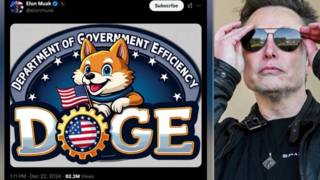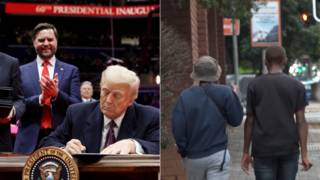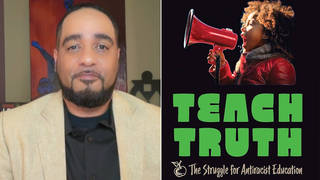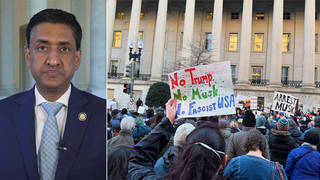
Related
Guests
- David HoffmanPulitzer Prize-winning journalist for The Washington Post who resigned from the editorial board after the paper declined to endorse a candidate for president.
- Mariel Garzaformer editorials editor at the Los Angeles Times who resigned after the paper’s owner blocked an endorsement of Kamala Harris for president.
The Los Angeles Times and The Washington Post announced that they would not be endorsing anyone in the U.S. presidential election this year, breaking decades of precedent and overriding planned endorsements of Kamala Harris. The decisions were ordered by the outlets’ multibillionaire owners, Patrick Soon-Shiong and Jeff Bezos. We speak with the Los Angeles Times editorials editor Mariel Garza, who quit when the paper killed the endorsement of Harris, and veteran Washington Post reporter David Hoffman, who stepped down from the paper’s editorial board in response. “We are right on the doorstep of the most consequential election in our lifetimes. To pull the plug on the endorsement, to go silent against Trump days before the election, that to me was just unconscionable,” says Hoffman. “This is not a time in American history when anyone can remain silent or neutral,” adds Garza.
Transcript
AMY GOODMAN: This is Democracy Now!, democracynow.org, “War, Peace and the Presidency.” I’m Amy Goodman, with Juan González.
The Los Angeles Times and The Washington Post are facing mounting backlash after the papers’ publishers announced no presidential endorsements would be made this year. The L.A. Times is owned by billionaire Patrick Soon-Shiong, and The Washington Post is owned by Amazon’s Jeff Bezos. NPR is reporting more than 200,000 people have canceled their Washington Post subscriptions, and counting.
A number of journalists have also resigned, including the editorials editor at the Los Angeles Times, Mariel Garza, who wrote, “How could we spend eight years railing against Trump and the danger his leadership poses to the country and then fail to endorse the perfectly decent Democrat challenger — who we previously endorsed for the U.S. Senate?” unquote. Veteran journalists Robert Greene and Karin Klein have also resigned from the L.A. Times editorial board.
At The Washington Post, David Hoffman and Molly Roberts both resigned on Monday from the Post editorial board. Michele Norris also resigned as a Washington Post columnist, and Robert Kagan resigned as editor-at-large. David Hoffman, who just won a Pulitzer Prize for his series “Annals of Autocracy,” wrote, quote, “I believe we face a very real threat of autocracy in the candidacy of Donald Trump. I find it untenable and unconscionable that we have lost our voice at this perilous moment.”
David Hoffman joins us now, along with former Los Angeles Times editorials editor Mariel Garza.
David Hoffman, let’s begin with you. Explain why you left The Washington Post editorial board. Oh, and at the same time, congratulations on your Pulitzer Prize.
DAVID HOFFMAN: Thank you very much.
I worked for 12 years writing editorials in which I said over and over again, “We cannot be silent in the face of dictatorship, not anywhere.” And I wrote about dissidents who were imprisoned for speaking out. And I felt that I couldn’t write another editorial decrying silence if we were going to be silent in the face of Trump’s autocracy. And I feel very, very strongly that the campaign has exposed his intention to be an autocrat.
JUAN GONZÁLEZ: And, David Hoffman, is there any precedent for the publisher of The Washington Post overruling their own editorial board?
DAVID HOFFMAN: Yeah, there’s lots of precedent. It’s entirely within the right of the publisher and the owner to do this. Previous owners have often told the editorial board what to say, because we are the voice of the institution and its owner. So, there’s nothing wrong with that.
What’s wrong here is the timing. If they had made this decision early in the year and announced, as a principle, they don’t want to issue endorsements, nobody would have even blinked. A lot of papers don’t. People have rightly questioned whether they actually have any impact. What matters here was, we are right on the doorstep of the most consequential election in our lifetimes. To pull the plug on the endorsement, to go silent against Trump days before the election, that to me was just unconscionable.
JUAN GONZÁLEZ: And, Mariel Garza, could you talk about the situation at the L.A. Times and your reaction when you heard of the owner’s decision?
MARIEL GARZA: Certainly. It was a long conversation over the course of many weeks. We presented our proposal to endorse Kamala Harris. And, of course, there was — to us, there was no question that we would endorse her. We spent nine years talking about the dangers of Trump, called him unfit in 5 million ways, and Kamala Harris is somebody that we know. She’s a California elected official. We’ve had a lot of conversations with her. We’ve seen her career evolved. We were going to — we were going to endorse her. And there was no indication that we were going to suddenly shift to a neutral position, certainly not within a few weeks or months of the election.
At first, we didn’t get a clear answer — sounds like it’s the same situation that happened at The Washington Post — until we pressed for one. We presented an outline with — these are the points we’re going to make — and an argument for why not only was it important for us, an editorial board whose mission is to speak truth to power, to stand up to tyranny — our readers expect it. We’re a very liberal paper. There is no — there is no question what the editorial board believes, that Donald Trump should not be president ever.
AMY GOODMAN: Mariel, I wanted to —
MARIEL GARZA: So, it was perplexing. It was mystifying. It was — go ahead.
AMY GOODMAN: Mariel, I wanted to get your response to the daughter of the L.A. Times owner. On Saturday, Los Angeles Times owner Patrick Soon-Shiong’s daughter Nika Soon-Shiong posted a message online suggesting that her father’s decision was linked to Kamala Harris’s support for Israel’s war on Gaza. Nika wrote, quote, “Our family made the joint decision not to endorse a Presidential candidate. This was the first and only time I have been involved in the process. As a citizen of a country openly financing genocide, and as a family that experienced South African Apartheid, the endorsement was an opportunity to repudiate justifications for the widespread targeting of journalists and ongoing war on children,” she wrote. Her father, Patrick Soon-Shiong, later disputed her claim, saying that she has no role at the Los Angeles Times. Mariel Garza, your response?
MARIEL GARZA: Look, I really don’t know what to say, because I have — that was — if that was the case, it was never communicated to us. I do not know what goes on in the conversation in the Soon-Shiong household. I know that she is not — she does not participate in deliberations of the editorial board, as far as I know. I’ve never spoken to her. We all know how she feels about Gaza, because she’s a prolific tweeter. So, I really can’t say. And this is part of the bigger problem, is we were never given a reason for why we were being silent. If there was a reason — say it was Israel — we could have explained that to readers. Instead, we remain silent. And that’s — I mean, this is not a time in American history where anybody can remain silent or neutral.
JUAN GONZÁLEZ: And, David Hoffman, this whole issue has been raised by some critics of Jeff Bezos that his company has a lot of business with the U.S. government, and whether that had any impact on Bezos’s decision. I’m wondering your thoughts.
DAVID HOFFMAN: I can’t be inside his mind. His company does have big business, and he’s acknowledged it’s a complicating factor in his ownership. But I can’t really understand why he made this decision, and I don’t think it’s been very well explained. His explanation published today was that he wants sort of more civic quiet, and he thought an endorsement would add to the sense of anxiety and the poisonous atmosphere. But I disagree with that. I think, like in the L.A. Times, I think readers have come to expect us to be a voice of reason, and they’ve looked to endorsements at least for some clarity. So, frankly, I also feel that we’re still lacking an explanation.
AMY GOODMAN: You know, you have subtitle, the slogan of The Washington Post, of course, “Democracy Dies in Darkness.” It’s being mocked all over social media. One person wrote, “Hello Darkness My Old Friend.” David Hoffman, your response to that? But also, you won the Pulitzer Prize for your series “Annals of Autocracy,” and you talk about digital billionaires, as well, and what this means. How does this fit into your investigations?
DAVID HOFFMAN: You know, I would hope everybody would understand and acknowledge that we’ve done a lot of good for democracy and human rights. You know, I’ve had governments react sharply to a single editorial. When we call them out for imprisoning dissidents, it matters that we are very widely read. And that’s another reason why I feel this was a big mistake, because we actually were on a path, for decades, of championing democracy and human rights as an institution.
And, you know, I have to tell you, I wrote a book in Russia about oligarchs. I understand how difficult it is when you have a lively and independent group of journalists. And ownership really matters. And, you know, we’re not just another widget company. This is actually a group of very, very deep-thinking and oftentimes very aggressive people that have a desire to change the world. That’s the kind of journalism that The Washington Post has sponsored and engaged in.
In 2023, we published a series of editorials that took a look deep inside how China, Russia, Burma, you know, other places — how these autocracies function. One of the findings was that many of these dictatorships are using technology to clamp down on dissent, even things as tiny as a single tweet. Young people, young college students are being thrown in prison in Cuba, in Belarus, in Vietnam. And I documented these to show how this technology actually isn’t becoming a force for freedom, but it’s being turned on its head by dictatorship.
AMY GOODMAN: We have to leave it there, David Hoffman, Washington Post reporter, stepped down from the Post editorial board when they refused to endorse a presidential candidate; Mariel Garza, L.A. Times editorials editor who just resigned. I’m Amy Goodman, with Juan González.












Media Options